Black History Month Sale: 40% off all books, plus FREE SHIPPING on all U.S. orders over $50 | Use code JBHM26

The Cormac McCarthy Society is partnering with the University of South Carolina Press to publish an online database of the personal library of renowned author Cormac McCarthy. After his passing in 2023, McCarthy left behind a house and several storage units full of books. His family granted a team of scholars access to the collection and, in 2024, they began the formal process of cataloguing every book.
Stacey Peebles, the Cormac McCarthy Society’s current president and primary author of the project, has been studying McCarthy’s works since college and has been a part of that scholarly community for 30 years. She said, “To have the opportunity to walk into his house—absolutely filled to the brim with books, and then filled some more—was both personally and professionally thrilling. It would have been amazing just to see it all, but then to be able to go through everything, book by book, every nook and cranny of every shelf and stack and box, was even better. That experience gave me a tangible, cumulative sense of the world of ideas that McCarthy lived in, and that's what I hope others will be able to get from the catalog.”
The database, called the Cormac McCarthy Library Project, will have information about each volume McCarthy owned, including whether he had annotated it, if it was still wrapped, if he labeled it with a code from his personal cataloguing system and what that code was, and where the book was kept. Site users will be able to browse and search books by author, title, keywords, and ISBN or LOC number. The database will be open access, available via the University of South Carolina Press's Open Carolina collection to anyone with an internet connection, without restrictions or fees.
After the digital library’s completion, the books themselves will be divided among several institutions. This will make the database the single resource covering McCarthy’s library as a whole, and therefore an indispensable and comprehensive source for researchers.
The books have all been catalogued, and the data is currently being organized and curated. However, the process did not come without surprises and challenges. “We didn't anticipate, for instance, that McCarthy would have so many older, antiquarian books—not necessarily tremendously valuable, famous first editions, but obscure, oddball 19th-century volumes in attractive bindings,” Peebles said. “For me, the fun of finding things like that isn't just the discovery itself, but the fact that we were doing this as a team of McCarthy scholars, and so we could share that excitement (and occasional frustration and sore muscles) together.”
The September/October issue of Smithsonian magazine features a story by Richard Grant about McCarthy’s library and the cataloguing project.
According to Peebles, the database is anticipated to be available to the public as a searchable web platform by late 2026 or 2027. If you would like to help support the project, or for updates on its progress, you can read more on the Cormac McCarthy Society’s website.
Written by Elise Lo, summer 2025 acquisitions intern.
Above photo caption: These books, shown stacked on McCarthy's pool table, were all on shelves in his house. They show the breadth of his subjects of interest, from fly fishing to Falstaff, Jefferson to Wittgenstein to Oppenheimer, and most of them are annotated. Photograph © Wayne Martin Belger.
Categories: News
Posted: February 18, 2026
Posted: February 4, 2026
Copyright 2026
Website By Morweb.org